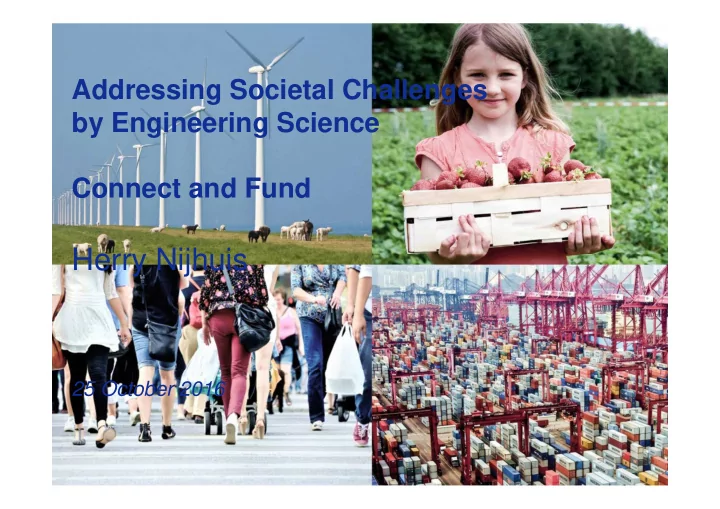

Addressing Societal Challenges by Engineering Science Connect and Fund Herry Nijhuis 25 October 2016
Introduction STW Approach � Funding applied and engineering sciences � Evaluating on scientific quality and utilisation perspective � Bringing researchers and potential users together � Optimising opportunities for transfer of knowledge
Background • Importance of engineering research in the Netherlands • Societal challenges • Role of engineering sciences • Dutch position • Ambition of NWO/AES
Dutch National Research Agenda • 11.700 Questions • 140 Cluster Questions • 25 Routes • 5 Chapters • Man, the environment and the economy • Individual and society • Sickness and health • Technology and Society • Fundamentals of existence
Cluster Questions • How can we make (bio)chemical production processes more sustainable, more efficient and cleaner • How should we undertake the transition to an entirely sustainable energy supply • Smart Industry: How do we make our factories smarter • How can we create a truly Circular Economy • How can we develop the stable and selective catalysts that we need to make the transition to sustainable energy, production systems and a biobased economy
Example routes • Regenerative medicine • Smart Industry • Smart, liveable cities • Circular economy and resource efficiency. • Sustainable production of safe and healthy food
Today Fuels Chemicals CO 2 Electricity Waste Waste water Clean Food water
Fuels Chemicals CO 2 Sustainable Energy Electricity Waste Waste water Clean Food water
(Blue) Energy Cl - Na + Cl - Na + Sea River River
(Blue) Energy Charge 2 HBr + electricity H 2 + Br 2 Discharge Discharge time Cl - Na + Cl - Na + Sea River River Power
Biogas production CO 2 Fuels Chemicals capture CO 2 Electricity Waste Waste water Clean Food water
12 CO 2 conversion
13 CO 2 conversion Power-2-Gas Conversion of surplus renewable energy into gaseous fuels and chemical building blocks CO 2 , CO, O 2 , H 2 , H 2 O, CH 4 Membrane separations
Biogas production CO 2 Fuels Chemicals capture CO 2 Sustainable Energy Electricity Waste Fuel cells/ Waste Storage H 2 O water Clean capture Food water WWTP Minerals
What is engineering science • Engineering science is a broad discipline that encompasses many different scientific principles and associated mathematics that underlie engineering. It integrates engineering, biological, chemical, mathematical, and physical sciences with the arts, humanities, social sciences, and the professions to tackle the most demanding challenges and advance the well-being of global society What do engineering scientists do? • The unique knowledge and interdisciplinary skill set of engineering scientists allows them to merge multidisciplinary resources to propose and develop innovative, enduring solutions and transform the latest scientific discoveries into enabling new technologies. • Engineering scientists research, develop, and design new materials, devices, sensors, and processes for a diverse range of applications. * Penn State University
Engineering sciences in the Netherlands Excellence by Public Private Partnerships � Nanonet/next � Qutech � Chemical Building Blocks Consortium � BE Basic � Brainport � Chemelot � Bio Science Park
Life sciences & health Chemistry HTSM Horticulture � Advanced Production Engineering Energy Agri&food � Aquatic Biotechnology and Bioproduct Engineering � Products and Processes for Biotechnology in the Biobased Economy Water � Product Technology � Discrete Technology & Production Automation � Smart Manufacturing Systems � Green Chemical Reaction Engineering
Funding excellent research M€ 50 M€ 25 M€ 25
Funding schemes 1/2 VENI-VIDI-VICI
Goals user committee • Stimulate valorisation • Maximise mutual knowledge transfer • Wide application • Creation of network beyond project period
Technology Foundation STW • Powerful in Public Private Partnerships • Strong focus on Valorisation/Utilisation • Appropriate Toolbox Ambition • Strengthen internal (NWO) and external cooperation • Increase possibilities for the fundamentals • Further develop and extend utilisation skills • Guardian of the engineering sciences
22 Community Working together towards a new reality
Recommend
More recommend